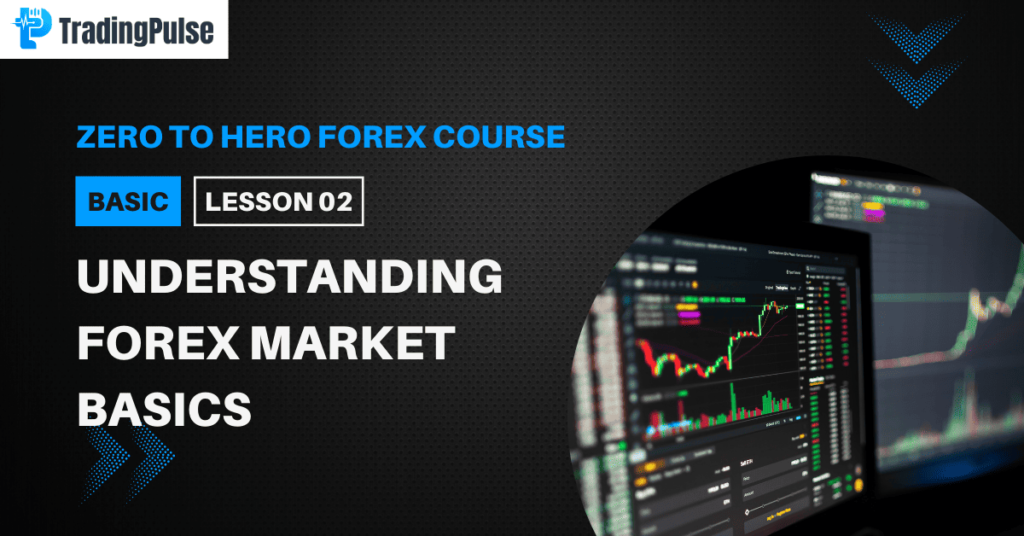
How the Forex Market Operates

When it comes to the stock market all the trading are done through a central location/exchange. Most of the US Stocks are traded through New York Stock Exchange, Japanese stocks are traded through Tokyo Stock Exchange, etc. Unlike other financial markets, the Forex market has no central exchange. Instead, it operates through a global network of banks, brokers, and financial institutions. This decentralized nature means that Forex trading can occur 24 hours a day, five days a week, across different time zones.
Major, Minor, and Exotic Currency Pairs
Currency pairs are generally categorized into three groups:
- Major Pairs: These involve the most traded currencies in the world, such as the US dollar (USD), euro (EUR), Japanese yen (JPY), British pound (GBP), Swiss franc (CHF), Canadian dollar (CAD), Australian dollar (AUD), and New Zealand dollar (NZD). Examples include EUR/USD, USD/JPY, and GBP/USD.
- Minor Pairs: These do not include the US dollar but consist of other major currencies. Examples include EUR/GBP, EUR/CHF, and GBP/JPY.
- Exotic Pairs: These involve one major currency and one currency from a smaller or emerging economy, such as USD/TRY (US dollar/Turkish lira) or USD/ZAR (US dollar/South African rand). Exotic pairs are less liquid and tend to have higher spreads.
Factors Influencing Currency Prices
Currency Prices go up or down depending on the Supply and Demand in the market. If there is a Demand for a certain currency, majority will start buying it which will make the price go up. And the opposite happens when there is a big Supply. Sudden changes in this Supply or Demand on the currencies can happen due to following factors.
- Economic Indicators: Countries release monthly and weekly reports on how their country is doing. Reports such as GDP growth, employment figures, retail sales, and industrial production provide insights into the economic health of a country and can move the currency value.
- Interest Rates: Central banks set interest rates to control inflation and economic growth. Higher interest rates tend to attract foreign investment, increasing demand for the currency.
- Political Stability: Countries with stable governments and predictable policies are more attractive to foreign investors, leading to a demand of that currency.
- Market Sentiment: Traders’ perceptions and expectations about future events can drive market movements. Positive sentiment towards a country’s economy can have a demand on its currency.
- Geopolitical Events: Wars, elections, and natural disasters can cause big movements in currency prices.
How to Analyze the Forex Market
To make informed trading decisions, traders use two main types of methods:
- Technical Analysis: This involves studying past price movements and trying to predict future movements of the market.
- Fundamental Analysis: This focuses on economic, political, and social factors that influence a country. Traders analyze economic reports, news releases, and central bank announcements to get an idea about the economy and predict the long term currency directions.
Trading Sessions in the Forex Market
The Forex market is open 24 hours a day, five days a week, but it is not equally active throughout the day. It is divided into four major trading sessions:
- Sydney Session: Starts at 10 PM GMT and closes at 7 AM GMT.
- Tokyo Session: Starts at 12 AM GMT and closes at 9 AM GMT.
- London Session: Starts at 8 AM GMT and closes at 5 PM GMT.
- New York Session: Starts at 1 PM GMT and closes at 10 PM GMT.
The overlap between the London and New York sessions is the most active period in the Forex market.
Understanding the basic structure and operation of the Forex market is essential for any trader. By knowing the fundamentals of currency pairs, market participants, and the factors influencing currency prices, traders can build a solid foundation for their Forex trading journey. Whether you prefer technical or fundamental analysis, having a good understanding of the Forex market will enhance your ability to make informed and strategic trading decisions.
